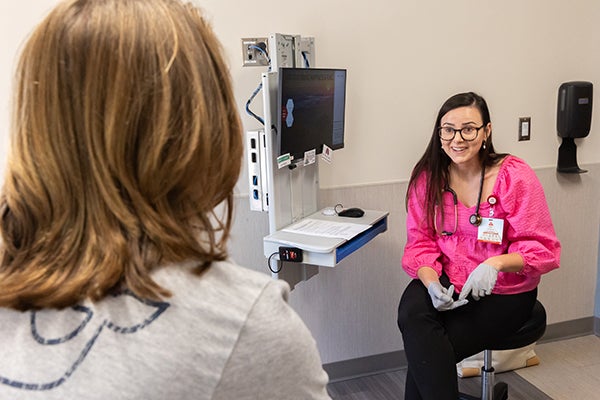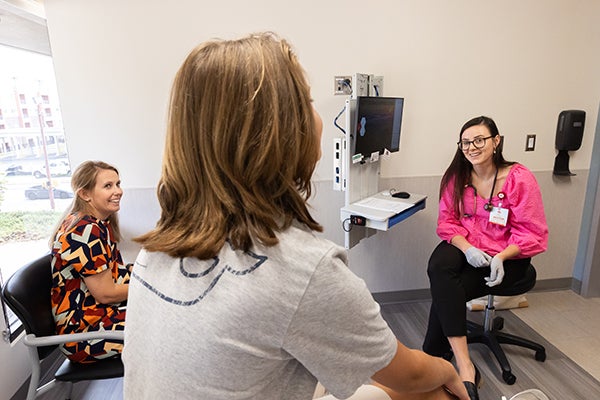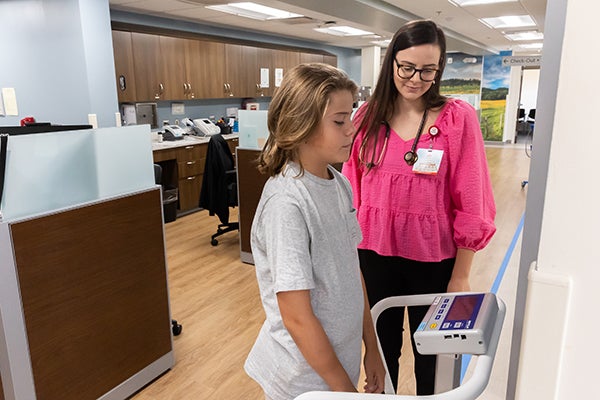Don't Forget Your Child's Physical When You're Making Your Back-to-School To-Do List
August 16, 2024
By: WakeMed Health & Hospitals
Categories: Children's, Primary Care
Hip hip hooray for the return to school and school sports! All students should ideally have an annual wellness check before returning to school. Student athletes may require an additional sports physical. From contact sports, such as football and soccer to non-contact sports, such as swimming and track, school-aged children of all ages and sizes are gearing up for a winning season.

The annual wellness check is a way to ensure that a student has all immunizations up to date. It is also a great way to check for any physical or emotional health concerns.
As for student athletes, before a child can play, many schools require that children undergo a sports physical providing a medical release to play. Parents and guardians may not think much of this physical, but according to WakeMed Primary Care provider Sara Miller, NP, these exams are critical and findings could be lifesaving.
The Annual Wellness Check
The comprehensive annual wellness check includes a review of your child's height and weight to make sure development is in line with what is expected for your child's age. Children will also have their blood pressure, vision and hearing checked. Your child's provider will also ask questions to monitor your child's emotional and physical well-being. Questions may include concerns about seatbelt safety, friendships, sunscreen usage, at home safety and development. If needed, your child may receive an immunization.

The sports physical is another layer of checks and does not replace the annual wellness check. It augments it.
According to Miller, who has a pediatric focus in primary care, "Annual wellness exams and sports physicals, while similar, serve different purposes that are important to know. An annual wellness exam, also known as a physical or well child visit, is a yearly exam that serves as a comprehensive exam. These start from infancy and are performed annually. These exams include assuring children are hitting their appropriate milestones and are developing at anticipated Tanner stages. It is also a time for reviewing vaccination history, administering new vaccines, conducting lab work and discussing future anticipated needs."
Duration of the Sports Physical
Sports physicals in the Wake County, North Carolina area are good for 12 months. They can be used for a variety of sports. So, if a child wants to play a spring and fall sport during one academic year, that physical is good for the entire timeframe.
School Forms

School sports medical forms change. Parents and guardians should obtain the document from the child’s school since this will be the correct form with the appropriate deadline for submission. Parents and guardians should fill out these forms completely prior to the appointment. About two pages of the document ask questions about health history. This information from the point of view of the caregiver is vital for the provider.
The Importance of the Sports Physical
Numerous health issues could emerge during a sporting event if and when a child is injured, exhausted, dehydrated and more. If a child has an unknown, underlying medical condition, physical exertion could prove detrimental. Issues, such as heart disease, metabolic problems, eating disorders, joint problems, seizures, etc. could present during a sporting event resulting in a medical emergency.
If a student athlete is found to have any of these conditions, catching them during the sports physical could be lifesaving.
What’s Included in the Sports Physical
With that in mind, you may be wondering what is involved in a student athlete sports physical.

A sports physical will check the following:
- Fitness (abdomen, heart, lungs, nose, throat)
- Flexibility (range of motion)
- Hearing
- Joints (mobility, posture, strength)
- Psychological development (maturity, mood, eating disorders/addictions, family dynamics)
- Vision
- Vitals (blood pressure, height, weight, growth spurts, temperature)
Our providers at WakeMed Primary Care may also offer guidance to help your athlete build a healthier body as well as determine nutritional needs for optimal performance.

Hidden Mental Health Issues and Sports
One small component of both the annual and sports physical is the psychological assessment. While it is brief, it is also very important, especially if a child wants to play contact sports which increase the chance for a concussion.
Head trauma has been shown to affect psychological well-being and increase the likelihood of psychological problems over the course of a lifetime, so health care providers need to know beforehand if the athlete is in a healthy state of mind to play sports.
Also, the psychological assessment may reveal potential physical health concerns that could be missed otherwise. For example, a discussion of a student’s mental well-being may bring up an unhealthy relationship with food, which could be an eating disorder.
Miller comments, "These exams address a child or adolescent's health history, mental health status, social history, safety in home, sleep health and preventative care needs."
Hypothetically speaking, if a child has an eating disorder and is perhaps 5’5” tall but weighs just 80 pounds, the provider may not sign the release for the child to play sports because of concerns of further jeopardizing the child’s physical health while playing.
Height and Weight in the Sports Physical
The body mass index (BMI) is a measure of a person’s height and weight. Based on this combination, a child may be underweight, a normal weight, overweight or obese. If the child falls outside the range of a normal, healthy weight, there is cause for concern.

Yet, an underweight child who is naturally slim may be fine to play sports if the child has a consistent history of being on the lower part of the BMI curve. However, if a child suddenly lost a bunch of weight, then it could be dangerous for the child to play.
"Sports physicals do include assessing a child’s general health but with a greater focus on health concerns specific to playing sports. These include a full physical exam with a more focused assessment on current and past sport’s injuries, current fitness level, and any concerns for risks imposed by playing sports. Sport physicals generally start in middle school and extend through high school, generally being scheduled before a sports season starts. Both of these visits are about 30 mins in length and are often times combined if a provider so chooses," explains Miller.
The Right Choice for Your Child’s Sports Physical
WakeMed Primary Care features board-certified primary care, internal medicine and family medicine physicians conveniently located throughout the Triangle. Our exceptional and compassionate providers and care teams pride themselves on developing long-term relationships with their patients and their families.
Our desire is to establish a long-term relationship with you and your family, and that holds true for the annual wellness check and sports physical as well.
About Sara Miller, NP
 Sara Miller is a nurse practitioner with a broad range of clinical interests in pediatrics and young adults, survivorship primary care/preventative medicine and chronic care management. Miller earned her doctor of nursing practice at Baylor University in Waco, TX.
Sara Miller is a nurse practitioner with a broad range of clinical interests in pediatrics and young adults, survivorship primary care/preventative medicine and chronic care management. Miller earned her doctor of nursing practice at Baylor University in Waco, TX.
Miller believes that well-rounded, holistic patient care is focused on a firm understanding and collaborative effort between both the patient and provider. She understands that encouraging open dialogue and informing patients of the latest research empowers them to make educated decisions. Compassionate, evidence-based, preventive medicine are at the forefront for Miller as she administers care in an environment of warmth and empathy, so patients feel comfortable to seek care.
When not at work, Miller enjoys playing tennis and doing Pilates. She also loves exploring the outdoors, including the many North Carolina beaches — with her infant, husband and pup!
Disclaimer: The advice of individual medical providers serves as guidance from the specific provider and is not intended to establish standards of clinical practice or rules of law for WakeMed Health and Hospitals.